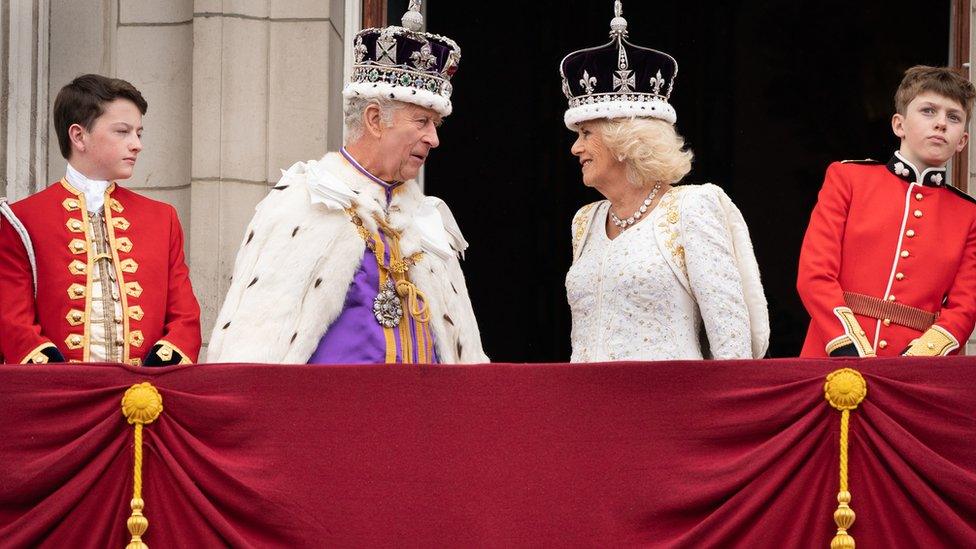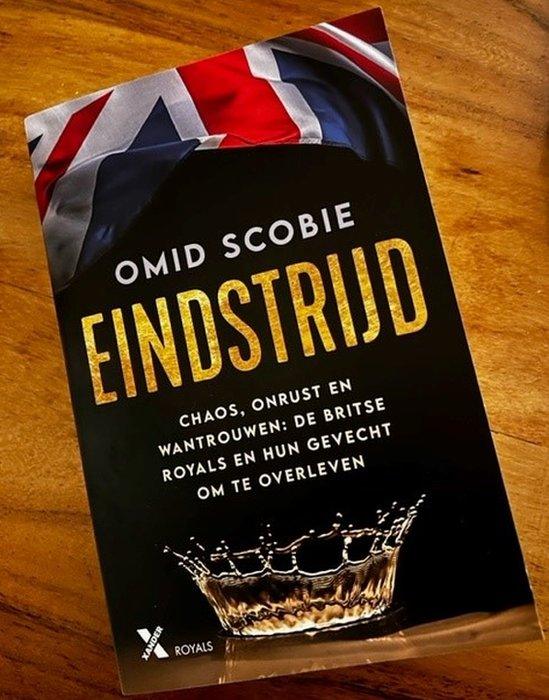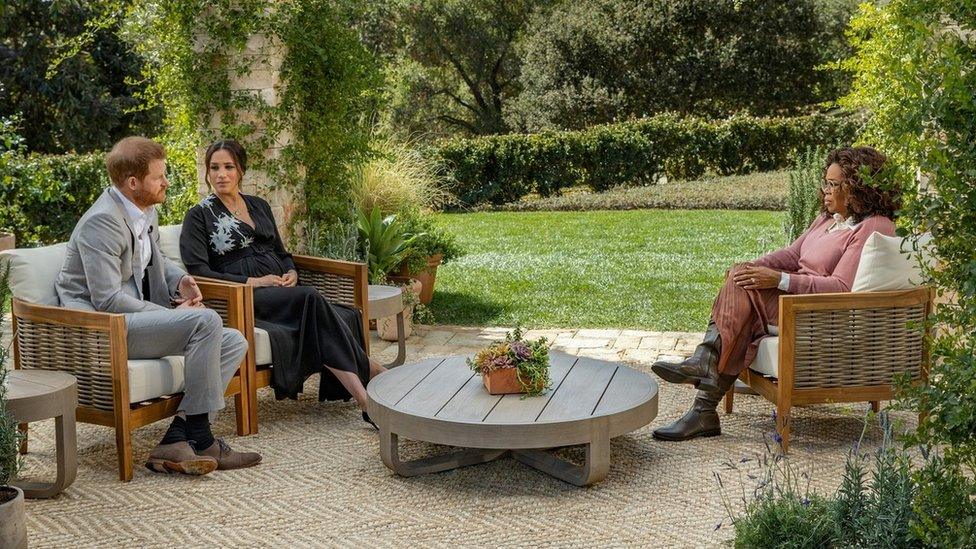How the Palace got stuck in Scobie-gate
- Published
Watch: Omid Scobie denies the Dutch printing error was a publicity stunt
Now that King Charles and Catherine, the Princess of Wales have been widely identified as the names in the race row mistakenly included in the Dutch edition of Omid Scobie's Endgame book, how can the Royal Family respond?
It is not helped by the Dutch publisher still not explaining how it happened - on Friday now saying it would not go further than previous, not very enlightening, comments about an "error". Is that the shadow of legal concerns?
Prince Harry and Meghan, who have stayed away from any association with the book, have yet to give their views on the trustworthiness of the allegations, stemming from their Oprah Winfrey interview in 2021.
But it is understood that they are strongly rejecting any suggestion that they or their team provided Scobie with the private letters supposedly identifying the two members of the Royal Family.
In terms of a response from Buckingham Palace, "all options are open", was the message on Friday. That does not rule out legal action, but the spread of the story is being driven as much by social media as by mainstream news organisations, which initially did not name names.
And how could you publicly respond to a book already pulped as a mistake?

All options are open, says Buckingham Palace about its response to what has appeared in the book's Dutch edition
What has made the reverberations so far-reaching is because it is over one of the most sensitive possible subjects for the royals - about race and possible perceptions of racism.
It goes back to the unresolved question that followed the Oprah Winfrey interview about who in the Royal Family had raised questions about the skin colour of the baby that Prince Harry and Meghan were expecting.
Although Prince Harry later emphasised this was about "unconscious bias" rather than racism, it still left a storm-cloud of questions.

The publishers have still not explained the differences in the Dutch edition
It was not helped by the race row over black British charity boss Ngozi Fulani being asked about where she was "really from" at a Buckingham Palace reception. And Commonwealth trips are now dogged with questions about the legacy of colonialism and slavery.
The timing is excruciatingly bad for the King too. It coincides with one of his biggest international speeches of the year, making the keynote address to the COP28 climate change summit, in front of world leaders gathered in Dubai.
The King should have been having a broadsheet moment, but instead is back in the tabloids again.
Like some kind of toxic oil-spill that began as a couple of lines buried in a book in Dutch, the leak has now spread everywhere.
But there should be big flashing hazard warning lights about all this. Because so much of this story remains speculative, unexplained and contradictory.
It is not at all clear what happened in the Royal Family conversations surrounding the skin colour of Prince Harry and Meghan's baby. The couple themselves have been adamant in not wanting to disclose who was involved.
The late Queen's observation was that "recollections may vary". And perceptions on racism can vary too.
Prince Harry, in an interview about his memoir Spare, said it had been the press that had called these family questions "racist", not the couple.

Meghan told Oprah Winfrey in their interview about the questions about her baby's skin colour
But Meghan's comments in the Oprah interview in 2021 about these conversations about her baby's colour had a different feeling.
Oprah asked: "Because they were concerned that if he were too brown, that that would be a problem? Are you saying that?"
Meghan replied: "I wasn't able to follow up with why, but if that's the assumption you're making, I think that feels like a pretty safe one, which was really hard to understand."
This was serious enough for Meghan not to reveal the names of those involved, saying: "I think that would be very damaging to them."
Scobie has repeatedly said he had never included any names in his manuscript. If that is the case, it is not the result of an earlier draft or previous version that was meant to have been changed.
"The book I edited didn't have names in it," he told the BBC's Newsnight programme on Thursday. It was a position he had put strongly on other interviews on UK and Dutch television.
He also said emphatically that it was not a marketing stunt.
The publishers initially blamed a mistake with the translation. But when it was evident that these lines, particularly about King Charles, were added to the Dutch edition, and not present in the English version, the position shifted to being a more general "error".
Adding to the confusion, the translator of the book told the Daily Mail she had simply translated what she was given.
If there had been some mix-up and the names were in a line that should have been removed, it still seems strange from a journalistic perspective that such a colossal revelation would have been carried in a couple of lines in the middle of the book.
While the reference to naming the King as part of this row is very clear, it is given in a short, unexplained line. The reference to the Princess of Wales is equally brief, but even vaguer.
It does not feel part of the rest of the text, when you would expect it to be the biggest part of the story.
Which is all to say, we do not know if these are the "real" names, alleged to have taken part in this uncertain conversation.
If this was found to be a false accusation - inserted at some point in the production process - it would fundamentally change the story.
But it will not be easy to reverse what is already out there.
The palace will be well aware of the so-called "Streisand Effect" - taking its name from an ill-fated attempt by Barbra Streisand to remove information about her property from online view, which in the process drew even more attention.
But the old royal approach to awkward news stories - "never explain, never complain" - becomes ever harder to maintain.
- Published1 December 2023
